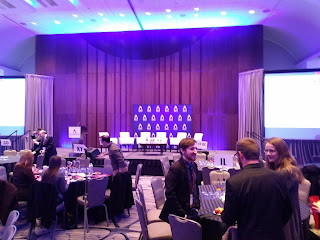Briefing on the National Endowment for the Arts, Tax Policy, and Arts Education Program
Issac Brown and Laurie Brown brought fantastic talking points and excellent examples for the protection of the NEA. This is especially important, as the NEA has been under attack via budget cuts for two years.
Here's everything you need to know about what's going on in the NEA:
A hot topic in DC admist the two appropriation cycles are, of course, budget cuts. (When is this not a topic?)
President Trump has proposed the elimination of the NEA completely in the new budget plan. (We'll also just gloss over the fact that this is contradicting directly with his campaign promises, but you know that already!) But that's the thing, these are just proposals. Everything has to be filtered through congress; only they can determine the fate of the NEA.
So in official terms, congress is interested in modest budget cuts for the NEA on a bipartisan platform. The Senate is gunning for a level playing field, and want to level the funding overall without the elimination of the NEA.
There are key points that are worth bringing up as well. We should focus on the exemplary partnerships with states. Funding that is funneled to the states is circulated immediately within the state. You can track funding directly from organizations to the federal government and the NEA.
During our meetings with legislature, we will want to bring up the issues of the NEA budget, as the representatives we meet will ultimately be the ones who decide what happens to the organizations.
Funding the NEA broadens the horizon for everyone. There's a high return investment and supports partnerships between communities and federal funding. In short, it's important to keep supporting the NEA and do everthing we can to defend everything they have gave and done for us.
Haley Cornelison
#ArtsAdvocacy #EMU
#ArtsAdvocacy #EMU
#ArtsManagement&Administration
_________
Funding in Arts Education
This year art supporters are advocating for a $30 Million increase for the Assistance for the Arts Edication programs (AAE) in the 2019 Labor-HHS Education Appropiation Bill.
This issue is one of many at the forefront of this year's Arts Advocacy conference. Without an increase in funding, it will result in under-funding for multi-year projects that are already in progress.
As we meet with legislators and their staff tomorrow, it's crucial that we emphasize the positive impact our artistic educational experiences have had on us. As an individual who is passionate about arts education, I can say without hesitation the Arts have given me the drive to become successful and have made me into the individual I am today.
I hope you all will take the time to visit the link below to learn more about the topic of arts in education.
Joshua Smith
#ArtsAdvocacy #EMU #ArtsManagement&Administration
http://guidebook.com/guide/121969/poi/9437595/
__________
#ArtsAdvocacy #EMU #ArtsManagement&Administration
http://guidebook.com/guide/121969/poi/9437595/
__________
Heather Noonan, League of American Orchestra, provided us with an excellent look at tax policy. Although we learned that the NEA provides funding for organizations, charitable giving contributes to a majority of funding for those organizations. I thought something that is essential to keep in mind was that it is important to understand that people donate because they CARE not because of tax policy. Unfortunately, history does provide evidence that tax policy does contribute to how much and when donors give so this is incredibly important to speak to legislation about.
Noonan expanded on the importance of Universal Charitable Deduction which was something brought up last year, but was not introduced this year. This would allow for people to deduct charitable contributions from taxes. On a positive note, people are able to donate more, but something we may hear tomorrow on the hill is that the new tax policy is only for "rich" people. THIS IS FALSE because giving is a pipeline and we must keep in mind that we should start finding potential donors NOW regardless of their economic status and we currently welcome anyone to donate regardless of economic status.
A few talking points were:
-Keeping focus on motivations in giving
-Highlighting charitable giving incentives (look in handbook)
-Upmost importance of tracking changes in giving
-Keeping focus on motivations in giving
-Highlighting charitable giving incentives (look in handbook)
-Upmost importance of tracking changes in giving
***Telling your story (how are donations essential for a organization you know and love)
Alison Carpenter
#ArtsAdvocacy #EMU #ArtsManagement&Administration http://guidebook.com/guide/121969/poi/9437603/
#ArtsAdvocacy #EMU #ArtsManagement&Administration http://guidebook.com/guide/121969/poi/9437603/
Edited by Nafeesah.




Comments
Post a Comment